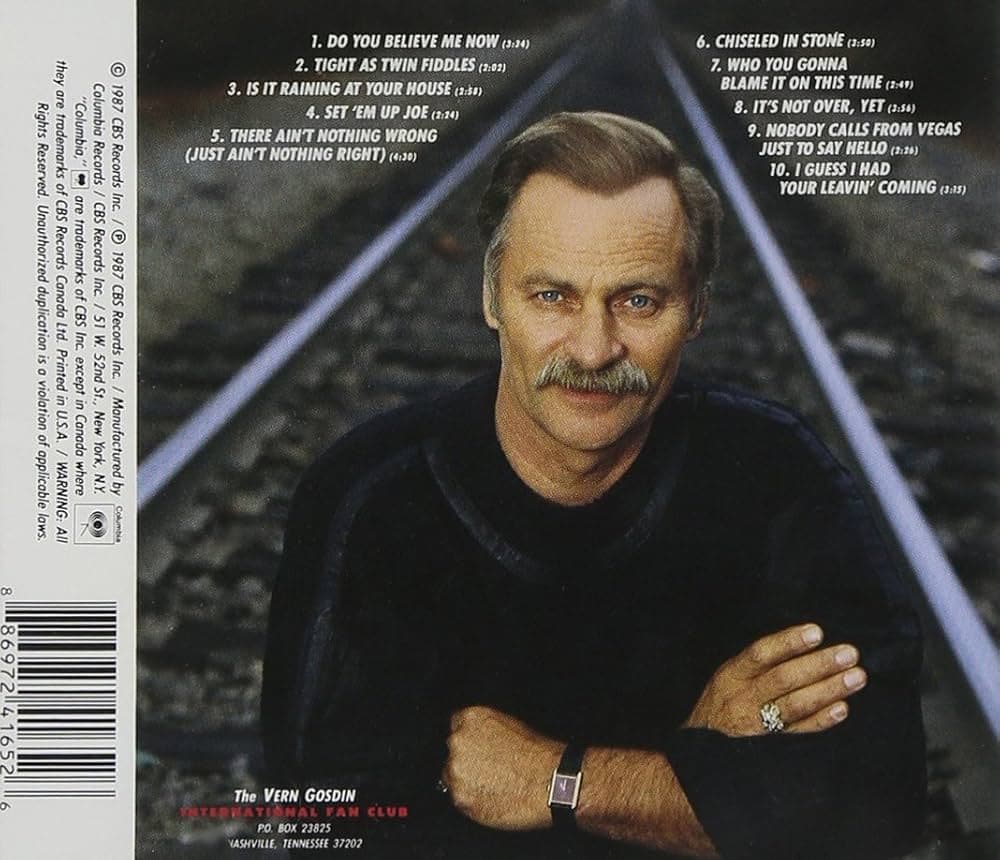
A Farewell’s Sting: The Chilling Echo of a Broken Heart
There are songs that simply drift through our memories, pleasant enough, but others… others reach deep down, touching a raw nerve, reminding us of moments and feelings we thought long buried. For many of us who remember the golden age of country music, the late Vern Gosdin had a unique way of doing just that. His voice, a mournful instrument perfected by years of hard living and even harder loving, could convey more heartache in a single syllable than most singers could in an entire album. And few songs capture that quintessential Gosdinian pathos quite like “Baby, That’s Cold.”
Released in 1988, “Baby, That’s Cold” was a significant track from Vern Gosdin‘s highly acclaimed album, “Chiseled in Stone.” While the album itself was a critical darling and produced multiple hits, this particular single didn’t quite reach the pinnacle of the country charts, peaking at a respectable number 24 on the Billboard Hot Country Singles & Tracks chart. Yet, its impact far outlasted its chart run. For those of us who tuned into country radio back then, or perhaps still spin our vinyl on a quiet evening, “Baby, That’s Cold” resonated with a profound truth about love’s inevitable decline and the painful detachment that can follow. It may not have been a chart-topper in the way some of his other classics were, but it carved out a deep, lasting place in the hearts of listeners who understood its quiet despair.
The story behind “Baby, That’s Cold” is one deeply rooted in the often-harsh realities of relationships and the raw emotional honesty that defined Vern Gosdin‘s songwriting. Co-written by Vern Gosdin himself and Max D. Barnes, the song encapsulates the chilling moment of realization that a love once vibrant has completely withered, replaced by an unsettling indifference. Gosdin was known as “The Voice of Country Music” for a reason; his personal life was often as tumultuous and heartfelt as the stories he sang. He lived the lyrics, and that authenticity poured into every note. This song isn’t about a fiery breakup or a dramatic confrontation. Instead, it’s about that quiet, almost terrifying moment when you look into the eyes of someone you once loved deeply, and see nothing but an empty gaze, a complete absence of the warmth that once defined your connection. It’s the feeling of walking into a house that used to be filled with laughter and finding it utterly silent, the echoes of joy replaced by a pervasive chill.
The meaning of “Baby, That’s Cold” is strikingly clear: it’s a lament for a love that has died not with a bang, but with a whimper, a slow, agonizing fade into emotional frost. The lyrics paint a vivid picture of a narrator confronting the chilling indifference of a former lover. Lines like “You can laugh at my pain, you can call me names / But baby, that’s cold” highlight the stark contrast between the narrator’s lingering heartache and the other person’s utter lack of empathy. It speaks to the universal experience of being on the receiving end of emotional detachment, a feeling that can be far more devastating than anger or accusation. For many of us, this song brings back memories of similar encounters, of trying to reignite a flame that has long since gone out, only to be met with a silence colder than any winter wind. It’s a testament to Gosdin‘s genius that he could articulate such a specific, yet widely felt, human experience with such tender precision. His voice, steeped in melancholy, wraps around each word, making the listener feel every ounce of the narrator’s profound loneliness and despair. It serves as a stark reminder that sometimes, the end of a relationship isn’t marked by tears or shouting, but by the devastating quietude of a heart that has simply ceased to care. And that, truly, “Baby, That’s Cold.”